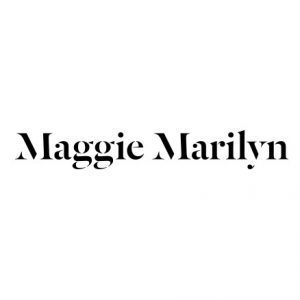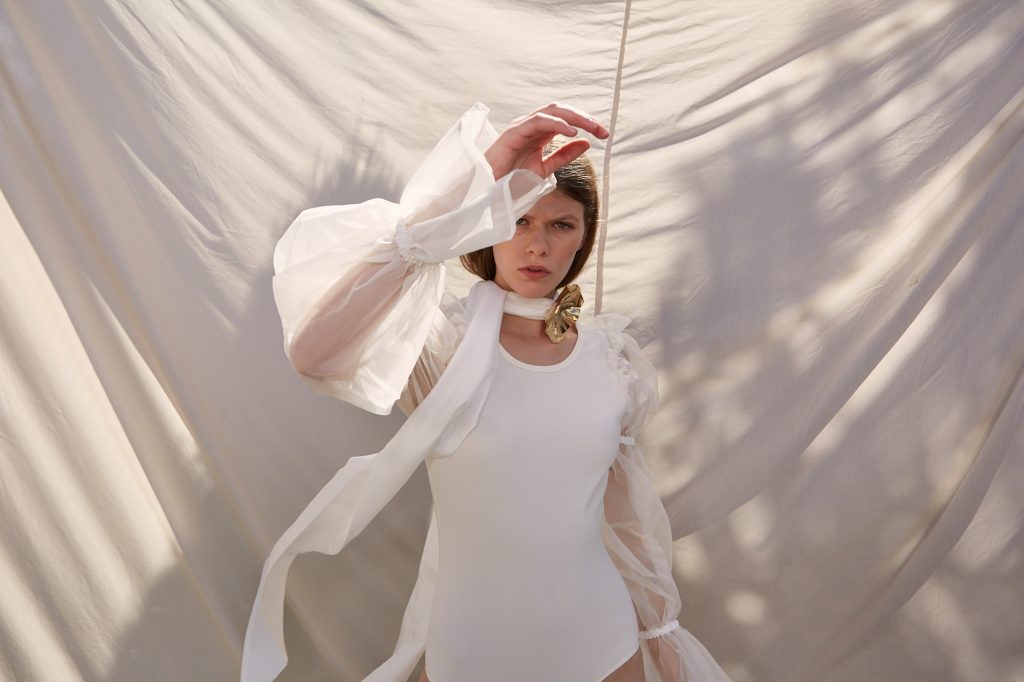Contents
Summary
History
Since learning about the detrimental environmental and social consequences of the fashion industry, Maggie Hewitt who is a native of a rural coastal region of New Zealand’s north Island, was determined to effect change. Graduating in Fashion and Sustainability from Whitecliffe College of Arts and Design, Hewitt wrote on her website that she had “pulled back the glamorous curtain of fashion and saw an industry that needed fixing, and fast.”
Rooted in these pillars the visionary twenty-one-year-old launched her ready-to-wear brand in 2016. There was no looking back. All virgin sourced fabrics are OEKO-TEX® or Bluesign certified to prove they are free from harmful chemicals and all textile suppliers have signed her Supplier Code of Conduct. What’s more the brand only uses wool that is ethically grown- non-mulesed and ZQ or Responsible Wool Standard certified. By making such choices Maggie Marilyn has genuinely upheld the brand principles and achieved a remarkable 73 per cent reduction in the brand’s carbon footprint to become a climate-positive enterprise.
The eponymous fashion brand champions people and planet. Per Vogue: ‘After four years of studying fine arts, majoring in fashion, at Auckland, Hewitt knew “I had a point of view, I had something, and I wanted to start my own brand”. She graduated and immediately designed a collection that adhered to her principle of “liveable luxury,” which she defines as “beautifully executed clothes, in beautiful fabrics, that you can wear every day. You can run or dance in them – they’re pieces you’d never hesitate to grab.” Then she took her samples to Sydney, and Net-A-Porter came knocking.’
At 23, Hewitt was “the next big thing”. Most of the apparel is manufactured in Auckland in a factory that is pretty close to her studio while knitwear is made in Italy. With a fine business acumen, Maggie had decided right from the onset of her fashion career that she would adopt a four-drops-a-year model showing twice a year in pre-collection time frames in order to streamline the production.
Today the fashion brand is rooted in the pillars of People- Product- Prosperity. And looking to the future Maggie Marilyn’s focus remains fixed on regeneration to ensure that every aspect of the operations from the farms cultivating fibers to the final products experiences a net gain compared to their initial state. And in line with the United Nations Sustainable Development Goals, the ethical fashion brand is now working towards having a regenerative impact from controlling water usage to making as much locally as possible.
Today Maggie Marilyn is hailed as a leading direct-to-consumer ethical fashion label. Her goal is to make it a circular fashion brand where all the pieces are made to last. When some of the pieces require repair, Maggie Marilyn will provide the service free of charge and when the apparel sadly comes to the end of its life, the fashion designer will recycle or compost it. With such stylish apparel and a business acumen grounded in sustainability and circularity is it a wonder then that Maggie Marilyn has A-list clientele ranging from Kylie Jenner and Karlie Kloss to the Duchess of Sussex?
Vision
Maggie Marilyn’s vision for her direct-to-consumer fashion label is grounded in a deep belief that the future of fashion hinges on transparency, circularity, regeneration, and inclusion. At the core of her philosophy is the idea that the entire lifecycle of a garment should be visible and traceable, from the raw materials at the farm to the final product in the consumer’s hands. This approach ensures that every individual involved in the production process is treated with dignity and respect, and that customers can make informed decisions, understanding the true value and impact of their purchases.
The brand’s vision is further shaped by three fundamental pillars: People, Planet, and Prosperity. Maggie Marilyn’s focus on “People” highlights the importance of fair and ethical labor practices, ensuring that all workers in the supply chain are respected and empowered. The “Planet” pillar emphasizes sustainability, aiming to reduce the fashion industry’s environmental impact through a circular business model where waste is minimized, and resources are reused. Finally, “Prosperity” extends beyond financial success, reflecting a commitment to creating positive outcomes for society and the environment, fostering a future where both businesses and ecosystems thrive in harmony.
Today, Maggie Marilyn embodies this vision by achieving climate-positive status and committing to a regenerative and decarbonized supply chain. The brand’s dedication to its circular business model shows a clear focus on reducing waste and enhancing sustainability at every stage of production. With a bold plan to reshape the fashion industry, Maggie Marilyn is leading the charge towards a more inclusive, transparent, and environmentally conscious future in fashion.
Mission Statement
Maggie Marilyn’s mission is to revolutionize the fashion industry by creating a system that is transparent, circular, regenerative, and inclusive. The brand is committed to transforming the way fashion operates, aiming for complete transparency throughout the supply chain. This means enabling consumers to trace each garment from its origins, such as the farm where raw materials are sourced, to the final stages of production. By fostering this level of openness, Maggie Marilyn seeks to build trust with consumers and encourage them to understand the real impact of their purchases. The mission also embraces circularity, with the goal of designing products that have a continuous life cycle, minimizing waste by reusing, recycling, and regenerating materials.
In addition to transparency and circularity, the mission emphasizes the importance of regeneration and inclusion. Maggie Marilyn envisions a fashion ecosystem where resources are not merely extracted, but renewed and restored, supporting environmental regeneration rather than depletion. The brand is equally focused on creating a more inclusive industry—one that values and respects all individuals involved, from workers in the supply chain to consumers. By championing fair labor practices and ensuring that everyone has access to the benefits of a sustainable future, Maggie Marilyn’s mission aims to shape a fashion industry that not only produces beautiful garments but also fosters positive social and environmental impact at every level.
History
Hailing from a rural coastal region in New Zealand, Maggie Hewitt’s aspirations to protect our nature was ingrained since childhood. Graduating in Fashion and Sustainability from Whitecliffe College of Arts and Design, Hewitt wrote on her website that she had ‘pulled back the glamorous curtain of fashion and saw an industry that needed fixing, and fast.’ The young girl envisioned building a brand that champions transparency, empowers people and ensures that people and planet were at the forefront of each decision. ”I wanted to make beautiful clothes from an equally beautiful supply chain that would positively affect local communities and the planet. I strongly believe that style and sustainability can and should co-exist,” she told Eco-Age.
Rooted in these pillars, ready-to-wear brand ‘Maggie Marilyn’ launched in 2016 and experienced a stratospheric ascent. Following her showcase at Sydney Fashion Week, she was the first designer Net-a-Porter retailed on the strength of a debut she describes as ‘liveable luxury’ i.e. trans-seasonal raw silk dresses, ruffled skirts, denim jackets and cocooning coats handmade with organic cottons, ethically produced silks and recycled metal. Per Vogue, ”she visits New Zealand sheep farms to confirm the wool is sheared from happy, non-mulesed sheep; she ships her clothes in dissolvable bags made of cassava root; she holds her manufacturing partners to strict labor codes…” In line with the United Nations’ Sustainable Development Goals, the brand is working towards having a regenerative impact from controlling water usage to making as much locally as possible.
Today, Maggie Marilyn is hailed as a leading sustainable fashion brand and has A-list clientele ranging from Kylie Jenner and Karlie Kloss to the Duchess of Sussex. Per Harpers Bazaar, “…what makes Hewitt’s label so different, each manufacturer has their story told and they have a real sense of family, rather than simply an unknown production process. “We shot our Resort ’20 lookbook in three of our factories in Auckland,” she tells them. “It was really special being able to share with our wonderful manufacturers how the clothes and the outfits all come together and what they look like once shot. Everyone watching the shoot had such an immense feeling of pride and that’s what I love about manufacturing in New Zealand: we’re all in this together.”
Products and Services
Maggie Marilyn’s collections are a reflection of the brand’s commitment to sustainability, timeless design, and ethical production. Each collection is thoughtfully crafted with the goal of creating pieces that not only embody contemporary fashion but also stand the test of time in terms of both style and durability.
The fashion brand focuses on using sustainable, organic, and recycled materials, ensuring that every garment aligns with its core values of circularity and environmental responsibility. Maggie Marilyn’s designs are known for their refined aesthetic, combining modern silhouettes with elegant tailoring, resulting in versatile pieces that can be worn season after season. By creating collections that prioritize quality over quantity, the brand encourages consumers to adopt a more mindful approach to fashion consumption.
In addition to its thoughtfully curated collections, Maggie Marilyn offers services that reinforce its sustainable and customer-focused ethos. One notable service is the brand’s commitment to transparency, providing consumers with detailed information about the supply chain behind each product, allowing them to trace garments from farm to finished product. The brand also offers repair services, reinforcing its circular model by helping customers extend the life of their clothing. By offering such services, Maggie Marilyn not only strengthens its relationship with consumers but also promotes a more sustainable and responsible approach to fashion, encouraging individuals to invest in clothing that lasts and contributes to a healthier planet.
Awards and Recognition
The brand certifications include The Global Organic Textile Standard which is the worldwide leading textile processing standard for organic fibres and takes into account every step in the supply chain. This ensures the ecological status of textiles, from the harvesting of raw materials through environmentally and socially responsible manufacturing, up to labelling.
References
- Instagram profile of Maggie Marilyn Instagram
- Maggie Marilyn Can Make a Dress Do Crazy Things Harpers Bazaar
- Facebook profile of Maggie Marilyn Facebook
- Maggie Marilyn founder on her go-to vintage jeans Sydney Morning Herald
- Maggie Marilyn Australia Resort 2024 Vogue
- Eco-Friendly Fashion Essentials Forbes
- Maggie Marilyn’s latest “Forever” capsule Elle
- What you need to know about sustainable fashion this season Forbes
- Youtube channel of Maggie Marilyn Youtube
- Designer Maggie Marilyn on how to run a sustainable fashion business Harpers Bazaar
- Interview with Maggie Marilyn Vogue
- Maggie Marilyn Spring 2022 Ready To Wear Vogue
- LinkedIn page of Maggie Marilyn LinkedIn
- Maggie Marilyn’s capsule Yahoo Finance
- Official website of Maggie Marilyn Maggie Marilyn
- Principle beliefs of the direct-to-consumer fashion brand Maggie Marilyn
- Maggie Marilyn’s Joyful New Capsule FashioNZ
- Maggie Marilyn Pre-Fall 2022 Vogue





